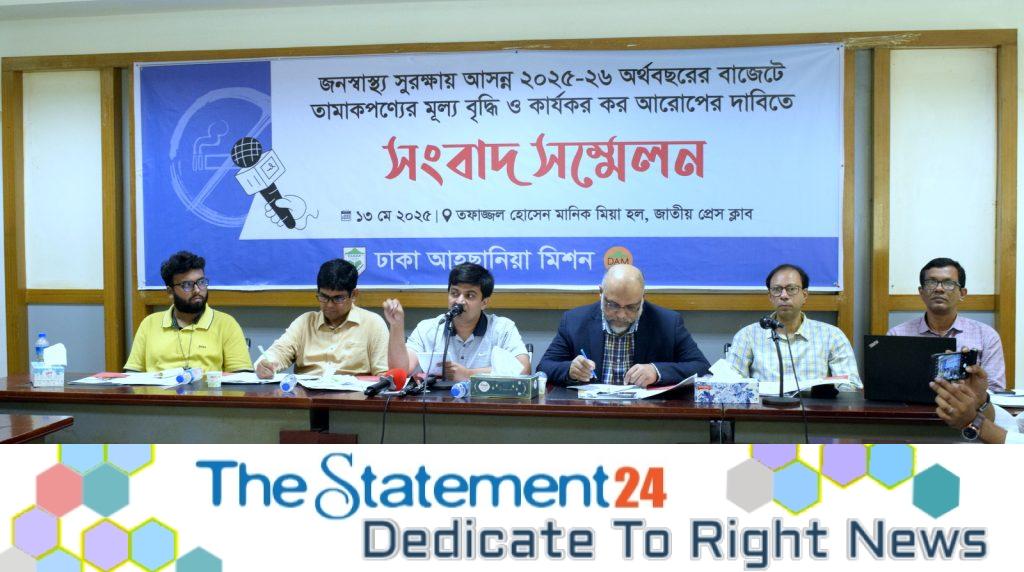
Researchers, doctors, media professionals, and tobacco control experts have called for an increase in tobacco product prices and the imposition of effective taxes in the upcoming 2025–26 national budget to protect public health by reducing tobacco use.
They made this appeal during a press conference titled “Demand for Price Increase and Effective Taxation on Tobacco Products in the Upcoming 2025–26 Budget for the Protection of Public Health,” organized by Dhaka Ahsania Mission at the National Press Club on May 13, 2025.
The speakers demanded that the lower and medium tiers of cigarettes be merged and that the minimum retail price of a 10-stick cigarette pack be set at BDT 90. They stated that since the price difference between the lower and medium tiers is minimal, users often switch to the lower tier when prices increase. Merging the two tiers and raising prices would discourage this behavior, particularly among youth, potentially preventing nearly 900,000 premature deaths among young people over the long term.
The event was presided over by Iqbal Masud, Director of the Health and WASH Sector at Dhaka Ahsania Mission. Key speakers included Dr. Syed Akram Hossain, Member of the Health Sector Reform Commission; Professor Dr. Shafiun Nahin Shimul from the Department of Health Economics at the University of Dhaka; Sushanta Sinha, Special Correspondent at Ekattor TV; and AFM Sadman Sakib, member of the Youth Forum.
Shariful Islam, Coordinator of the Tobacco Control Project at Dhaka Ahsania Mission, presented the keynote. He noted that implementing the proposed tobacco tax reform in the 2025–26 fiscal year could reduce cigarette use from 15.1 percent to 13.03 percent, discourage nearly 24 million adults from smoking, and prevent about 17 million youths from initiating smoking. In the long run, this could prevent the premature deaths of 864,758 adults and 869,000 youths. Additionally, government revenue could reach BDT 68,000 crore, an increase of BDT 20,000 crore, or 43 percent more than the previous year.
In his remarks, Dr. Syed Akram Hossain stated that Bangladesh has over 2 million cancer patients, with tobacco directly responsible for 30 percent of cancer cases. He emphasized the Health Sector Reform Commission’s recommendation to impose a sin tax on all harmful products, including tobacco, and allocate the revenue for health protection. The Commission also called for urgent reform of the Tobacco Control Act. Dr. Hossain urged the government to take all necessary measures to reduce tobacco use.
Supporting the tax proposal, journalist Sushanta Sinha said that increasing taxes on tobacco products would raise government revenue while reducing company profits, as tax payments go entirely to the state treasury. He countered tobacco companies’ false claims that higher taxes would lead to increased smuggling, pointing out that cigarettes in Bangladesh are the cheapest in South Asia.
Dr. Shafiun Nahin Shimul stressed that in raising the prices of tobacco products, public health protection should take precedence over revenue collection. He noted that the revenue generated from tobacco sales currently covers only 75 percent of the healthcare costs related to tobacco. Effective taxation could increase government revenue from cigarette sales by 11 percent to present.
Speakers concluded by stating that the proposed tobacco tax reform would contribute to building a healthier nation, provide significant additional funding for the health sector and national development priorities, and strengthen a sustainable tax system.

